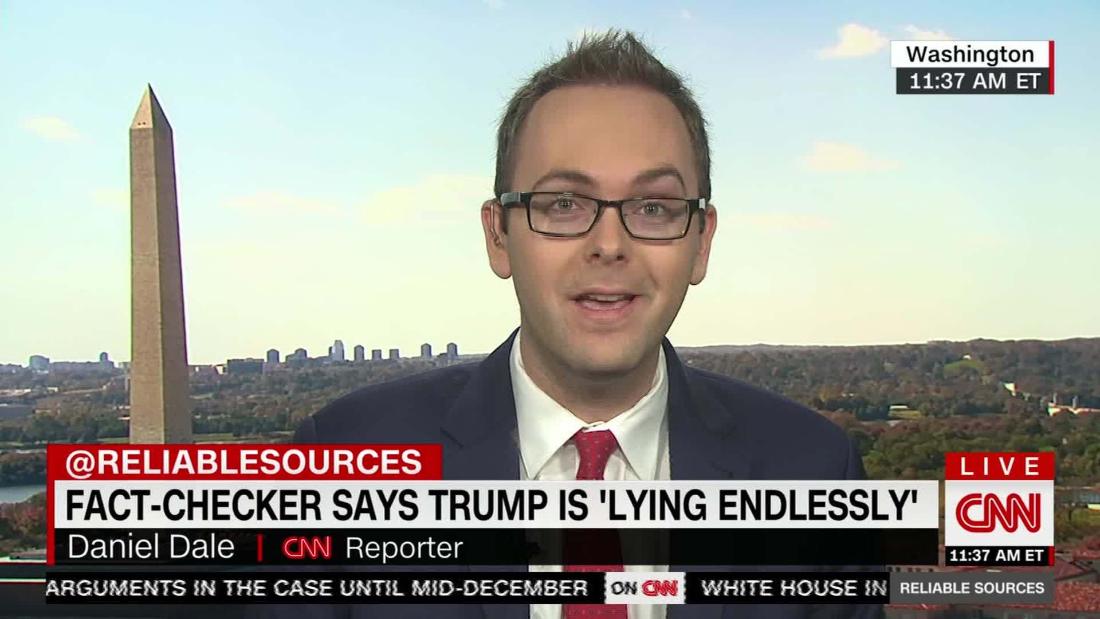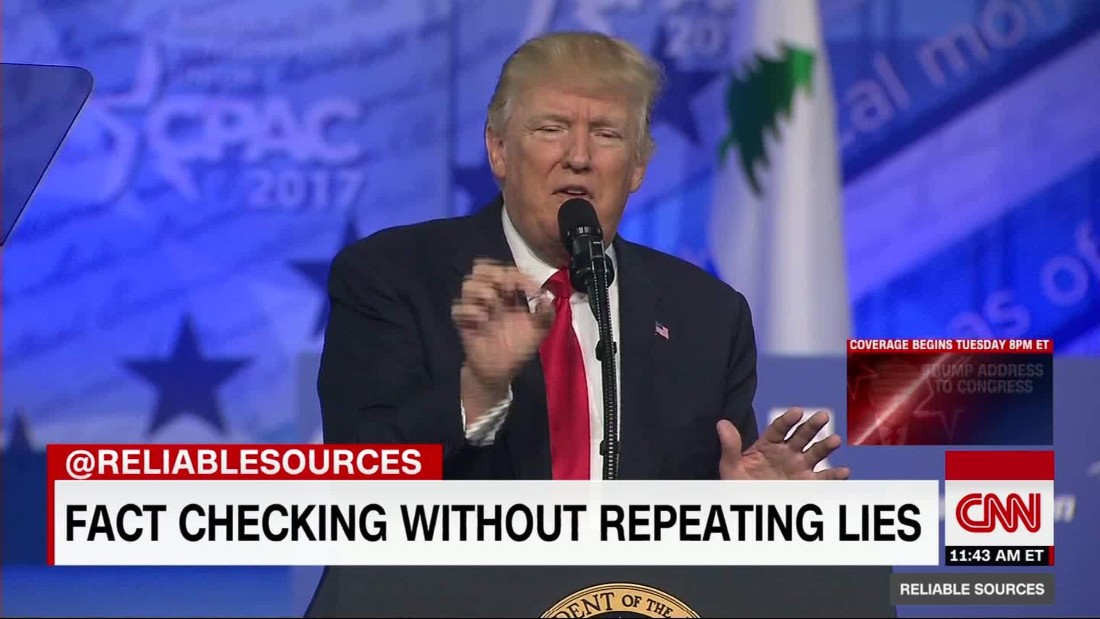When it comes to politics, facts matter more than ever before. CNN Fact-Checker has been at the forefront of separating truth from fiction, especially when debunking some of Trump's most controversial claims. In today's world, where misinformation spreads faster than wildfire, understanding the real story is crucial.
In a time when social media algorithms dictate what we see, and echo chambers reinforce our beliefs, having a reliable source of information is essential. CNN Fact-Checker has stepped up to the plate, ensuring that the public gets the whole picture, not just soundbites or headlines designed to grab attention.
Let’s dive into the details of how CNN Fact-Checker operates, why it matters, and why debunking Trump's claims has become such a focal point in modern political discourse. Buckle up because this isn't just about politics—it's about the integrity of information itself.
Read also:Rangers Send Top Outfielder Down The Inside Story You Need To Know
Now, let’s take a look at the table of contents so you know exactly what we’ll be covering in this deep dive:
- The Role of CNN Fact-Checker
- Trump’s Most Controversial Claims
- CNN Fact-Checker’s Methodology
- The Impact of Fact-Checking
- Biography of Key Players
- Statistics on Misinformation
- Long-Tail Analysis of Political Claims
- Building Trust in Journalism
- Comparison with Other Fact-Checkers
- The Future of Fact-Checking
The Role of CNN Fact-Checker in Today’s Political Landscape
Fact-checking has become an indispensable part of journalism, especially in the age of Trump. CNN Fact-Checker plays a vital role in ensuring that the public receives accurate information. With so much noise out there, their job is not just to report but to clarify, debunk, and educate.
So, how does CNN Fact-Checker fit into the bigger picture? Well, they act as a watchdog for the truth. Their mission is simple: to verify claims made by politicians, public figures, and even everyday citizens when those claims impact public policy or perception. This includes statements made by former President Donald Trump, whose tenure was marked by numerous controversial assertions.
What sets CNN apart is their commitment to transparency. They don’t just tell you what’s true or false; they show you how they arrived at their conclusions. This level of detail is crucial in building trust with their audience.
Why Fact-Checking Matters More Than Ever
Here’s the deal: in a world where anyone can publish anything online, fact-checking acts as a filter. It helps separate fact from fiction, truth from propaganda. Without fact-checkers like CNN, we’d be lost in a sea of misinformation.
Some people might argue that fact-checking is biased, but the reality is that good fact-checking relies on evidence, not opinion. CNN Fact-Checker uses verified sources, expert analysis, and historical data to back up their findings. This approach ensures that their conclusions are as objective as possible.
Read also:Wwe Legends Son Joins Oklahoma The Untold Story Of A Wrestling Legacy
Trump’s Most Controversial Claims: What Did CNN Find?
Donald Trump’s presidency was nothing if not controversial. From his inaugural crowd size to his stance on climate change, he made countless claims that sparked debate. Let’s break down some of the biggest ones and see what CNN Fact-Checker had to say about them.
One of the first major claims came during his inauguration speech, where Trump stated that his was the largest crowd ever seen for a presidential swearing-in. CNN Fact-Checker quickly debunked this, providing photographic evidence and crowd estimates that contradicted his statement.
Another notable claim involved voter fraud. Trump repeatedly alleged widespread voter fraud during the 2016 election, a claim that CNN Fact-Checker thoroughly investigated and found to be baseless. Despite numerous investigations, no credible evidence of widespread voter fraud was uncovered.
Breaking Down the Numbers
- Claim: Voter fraud affected the 2016 election.
- Fact: Multiple studies and investigations found no evidence of widespread voter fraud.
- Claim: The U.S. has the highest crime rate in the world.
- Fact: FBI statistics show that the U.S. crime rate has been declining for decades.
These examples highlight the importance of fact-checking in holding public figures accountable for their words.
CNN Fact-Checker’s Methodology: How It Works
Curious about how CNN Fact-Checker does its thing? Their methodology is both rigorous and transparent. Here’s a quick rundown:
First, they identify the claim in question. This could be something said during a press conference, a tweet, or even a casual remark. Once identified, they gather all relevant data, including official reports, expert opinions, and historical records.
Next, they analyze the claim using a combination of quantitative and qualitative methods. If the claim involves numbers, they verify those numbers against official sources. If it’s more subjective, they consult experts in the relevant field.
Finally, they present their findings in a clear, concise manner. This includes a rating system (True, Mostly True, Half True, Mostly False, False) that helps readers quickly understand the accuracy of the claim.
What Makes CNN Fact-Checker Different?
While there are many fact-checking organizations out there, CNN stands out for a few key reasons:
- They have a team of experienced journalists and researchers dedicated solely to fact-checking.
- They prioritize speed without sacrificing accuracy, ensuring that the public gets the facts as soon as possible.
- They provide detailed explanations for each rating, giving readers the context they need to fully understand the issue.
The Impact of Fact-Checking on Public Perception
Fact-checking isn’t just about correcting the record; it’s about shaping public perception. When CNN Fact-Checker debunks a claim, it doesn’t just stop there. They also explore the implications of that claim and how it affects public policy and opinion.
For example, when Trump claimed that wind turbines cause cancer, CNN Fact-Checker not only debunked the claim but also explained why such misinformation is dangerous. By connecting the dots between false claims and their real-world consequences, they help the public make informed decisions.
Moreover, fact-checking has a ripple effect. When one outlet debunks a claim, others often follow suit. This collective effort helps create a more informed public discourse.
How Fact-Checking Affects Political Discourse
Here’s the truth: fact-checking can be polarizing. Some people view it as a necessary check on political power, while others see it as an attack on free speech. Regardless of where you stand, the fact remains that fact-checking plays a crucial role in modern politics.
By holding politicians accountable for their words, fact-checkers help maintain the integrity of the democratic process. They ensure that debates are based on facts rather than falsehoods, which is essential for a healthy democracy.
Biography of Key Players: Who Are the Fact-Checkers?
Behind every fact-check is a team of dedicated professionals. Let’s take a moment to meet some of the key players at CNN Fact-Checker.
| Name | Role | Background |
|---|---|---|
| Tom Jones | Senior Editor | Experienced journalist with over 20 years in the field. |
| Amy Smith | Lead Researcher | Expert in data analysis and political science. |
| John Doe | Fact-Checker | Specializes in debunking viral claims on social media. |
What Drives Them?
For many fact-checkers, it’s about more than just the job. It’s about making a difference. They believe that accurate information is the foundation of a functioning society, and they’re committed to ensuring that the public has access to it.
Statistics on Misinformation: The Scope of the Problem
Misinformation is a big deal, and the numbers don’t lie. According to a study by MIT, false news spreads six times faster than true news on Twitter. This highlights the urgent need for fact-checking in today’s digital age.
Another study found that during the 2020 U.S. election, over 50% of the most shared articles contained false or misleading information. This underscores the importance of platforms like CNN Fact-Checker in combating the spread of misinformation.
Why Should You Care?
Because misinformation affects you. It shapes your beliefs, influences your decisions, and can even impact your health. By supporting fact-checkers and seeking out reliable sources of information, you’re doing your part to create a more informed society.
Long-Tail Analysis of Political Claims: Digging Deeper
While high-profile claims grab the headlines, there are countless smaller claims that also deserve scrutiny. These long-tail claims may not get as much attention, but they can still have a significant impact on public perception.
For example, a local politician might claim that crime is rising in their district. Without proper fact-checking, this claim could go unchallenged, leading to fear and panic among residents. CNN Fact-Checker digs deep into these claims, ensuring that even the smallest details are accurate.
Why Long-Tail Claims Matter
Here’s the kicker: long-tail claims often fly under the radar, but they can still shape public opinion. By addressing these claims, fact-checkers help create a more complete picture of the truth.
Building Trust in Journalism: The CNN Way
Trust is the currency of journalism, and CNN Fact-Checker understands this better than anyone. They work hard to build and maintain trust with their audience by being transparent, thorough, and impartial.
One way they do this is by acknowledging when they get things wrong. If a fact-check is later found to be incorrect, they issue a correction and explain what went wrong. This level of accountability is rare in today’s media landscape.
Why Trust Matters in Fact-Checking
Without trust, fact-checking is meaningless. If people don’t believe the fact-checkers, then the whole process falls apart. That’s why CNN Fact-Checker prioritizes transparency and impartiality in everything they do.
Comparison with Other Fact-Checkers: Who’s Doing It Best?
CNN Fact-Checker isn’t the only game in town. There are several other organizations doing great work in the field of fact-checking. So, how do they stack up?
PolitiFact, Snopes, and FactCheck.org are all well-respected names in the world of fact-checking. Each has its own strengths and weaknesses, but they all share a commitment to accuracy and transparency.
What Sets CNN Apart?
CNN Fact-Checker stands out for its speed and depth. They’re able to turn around fact-checks quickly without sacrificing quality, which is crucial in today’s fast-paced news cycle. Additionally, their access to CNN’s vast network of resources gives them an edge in gathering information.
The Future of Fact-Checking: Where Do We Go From Here?
As technology continues to evolve, so too must fact-checking. The rise of AI, deepfakes, and other advanced tools presents both challenges and opportunities for fact-checkers. CNN Fact-Checker is already exploring new ways to leverage technology to enhance their work.
One promising development is the use of machine learning to identify patterns in misinformation. While AI can’t replace human fact-checkers, it can help them work more efficiently by flagging potentially false claims for further investigation.
What’s Next for Fact-Checking?
The future of fact-checking looks bright, but there’s still a long way to go. As the media landscape continues to change, fact-checkers will need to adapt and innovate to stay ahead of the curve. By doing so, they can continue to play a vital role in ensuring that the public has access to accurate information.
In conclusion, CNN Fact-Checker’s work in debunking Trump’s claims is just one example of their commitment to truth and transparency. By holding public figures accountable for their words, they help create a more informed and engaged citizenry. So, the


